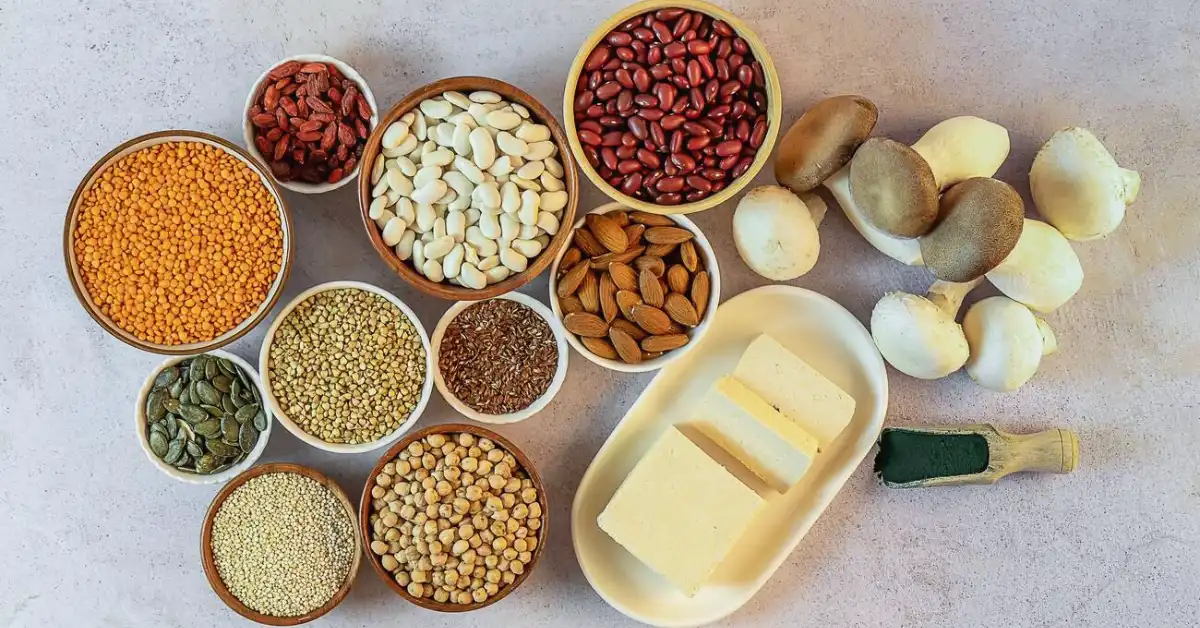Protein is a crucial macronutrient that plays a vital role in various bodily functions, from building and repairing tissues to supporting immune function and producing enzymes and hormones. For vegetarians who exclude meat and sometimes other animal products from their diet, ensuring adequate protein intake can be a challenge. In this comprehensive guide, we’ll explore the steps vegetarians can take to ensure they get proper levels of protein for optimal health and well-being.
Key Takeaways
- Protein is essential for overall health, and vegetarians need to be mindful of their protein intake.
- Challenges faced by vegetarians include the limited availability of complete protein sources and the need to combine different plant-based proteins.
- Incorporating a variety of plant-based protein sources, complementing with fruits, vegetables, and whole grains, and monitoring portion sizes are key steps for vegetarians to ensure proper protein levels.
Understanding Protein and its Importance
Protein is a macronutrient that consists of amino acids, which are the building blocks of life. It plays a crucial role in various bodily functions, including:
- Building and repairing tissues, such as muscles, bones, and skin
- Supporting immune function and producing antibodies
- Producing enzymes and hormones that regulate bodily processes
- Transporting nutrients and oxygen throughout the body
Adequate protein intake is essential for overall health, growth, and development. Without enough protein, the body may struggle to perform these vital functions, leading to potential health issues.
Also Read: How To Increase Ferritin Levels? Tips For Increasing Iron Stores
Challenges Faced by Vegetarians in Meeting Protein Needs
Vegetarians, particularly those who exclude all animal products (vegans), may face challenges in obtaining adequate protein levels. One of the main difficulties is the limited availability of complete protein sources in a vegetarian diet. Complete proteins contain all nine essential amino acids that the body cannot produce on its own.
While animal-based proteins, such as meat, poultry, fish, eggs, and dairy, are considered complete proteins, most plant-based proteins are incomplete, lacking one or more essential amino acids. To ensure a complete amino acid profile, vegetarians need to combine different plant-based protein sources, such as pairing legumes with grains or nuts with seeds.
Steps to Ensure Proper Protein Levels for Vegetarians
To ensure proper protein levels, vegetarians can follow these practical steps and strategies:
Include a variety of plant-based protein sources
- Legumes: beans, lentils, peas, chickpeas, and peanuts
- Soy products: tofu, tempeh, and edamame
- Whole grains: quinoa, oats, and brown rice
- Nuts and seeds: almonds, walnuts, chia seeds, and flax seeds
- Seitan, a protein-rich food made from wheat gluten
Complement protein intake with fruits, vegetables, and whole grains
- Fruits and vegetables provide essential vitamins, minerals, and fiber that support overall health and protein absorption
- Whole grains offer additional protein and fiber, as well as complex carbohydrates for sustained energy
Incorporate protein-rich snacks and supplements
- Snack on protein-rich options like hummus with vegetables, trail mix, or nut butter on whole-grain crackers
- Consider protein supplements, such as pea protein or hemp protein powders, to boost intake if necessary
Monitor protein intake and adjust portion sizes
- Track protein intake using a food diary or nutrition app to ensure adequate consumption
- Adjust portion sizes of protein-rich foods based on individual needs and goals
- Consult with a registered dietitian for personalized guidance on protein requirements
Conclusion
Protein is a vital macronutrient that plays a crucial role in maintaining overall health and well-being. For vegetarians, ensuring proper protein levels can be challenging due to the limited availability of complete protein sources in a plant-based diet.
By incorporating a variety of plant-based protein sources, complementing fruits, vegetables, and whole grains, and monitoring portion sizes, vegetarians can take proactive steps to meet their protein needs. Seeking guidance from healthcare professionals or registered dietitians can provide personalized advice and support in achieving optimal protein intake.
Remember, prioritizing protein in your vegetarian diet is essential for maintaining good health, supporting bodily functions, and promoting overall well-being.
Read More: How Many Carbs A Day To Lose Weight? Finding The Perfect Balance
FAQs
A: The recommended daily allowance (RDA) for protein is 0.8 grams per kilogram of body weight. For example, a 68-kilogram (150-pound) person would need about 54 grams of protein per day. However, individual protein needs may vary based on factors such as age, sex, activity level, and health status.
A: Yes, vegetarians can get enough protein without consuming animal products by including a variety of plant-based protein sources in their diet. Combining different plant proteins, such as legumes with grains or nuts with seeds, ensures a complete amino acid profile.
A: Protein supplements are not necessary for most vegetarians who consume a well-balanced diet that includes a variety of plant-based protein sources. However, in some cases, such as for athletes or those with higher protein needs, supplements like pea protein or hemp protein powders can be useful to boost intake.
A: Signs of protein deficiency in vegetarians may include:
– Fatigue and weakness
– Muscle loss and difficulty building muscle
– Slow wound healing
– Brittle hair and nails
– Increased appetite and cravings
– Weakened immune system
If you experience any of these symptoms, consult with a healthcare professional to assess your protein intake and overall nutritional status.

